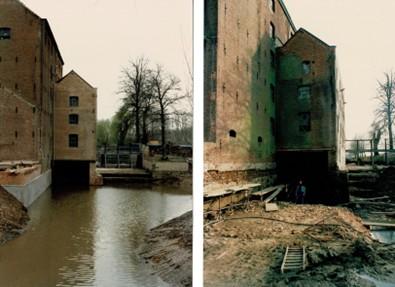On 8 October, the first pipe was laid at the AquaCOM's Belgian pilot site, the Rotselaar water mill, marking the start of this unique aquathermal heating network, led by the energy cooperative Ecopower and the aquathermal energy expert EXTRAQT, both of which are project partners in AquaCOM. Nine dwellings in the water mill's facilities are being connected to the network and will receive 100% green heat extracted from the river Dijle. This initiative is the first of this kind in the region of Flanders, representing also an important milestone for the involved project partners: Ecopower and EXTRAQT.

Sustainable heat on a historic heritage site
The historic mill of Rotselaar, where the energy cooperative Ecopower was founded in 1991, has been producing electricity with a small hydroelectric power station since 2004 and will soon also benefit from green heat. This pilot project demonstrates that it is possible to make existing homes and valuable heritage sites more sustainable, contributing to a fossil-free energy future.
"We
are proud to be implementing the very first heat network that heats nine
separate existing homes at once”, says Colette Van Loy, heat project manager at
Ecopower. “The heat source, aquathermal energy, is also an
innovative factor. With this project, Ecopower, an experienced producer and
supplier of Belgian green electricity, is taking major steps forward as a
developer of sustainable heat networks".
Ecological and technological added value
The pilot project will save 29 tonnes of CO₂ annually, equivalent to 300 solar panels. The system integrates various renewable technologies. The heat exchanger extracts energy from the Dijle river, which is converted into usable heat via heat pumps, directly powered by green electricity, generated by the water turbine on the site. Heat recovery from the generator and gearbox of the water turbine further boosts efficiency. The heat is delivered to residents' homes via a network of underground pipes. EXTRAQT investigated the impact of the heat exchanger on the water temperature of the Dijle.
The project was made possible thanks to the financial support of the AquaCOM project, under the EUU Interreg programme, and the Province of Vlaams-Brabant.
This initiative showcases how cooperative models can accelerate the transition to sustainable heating — particularly in existing buildings, where moving away from fossil fuels is more challenging than in new constructions. The voluntary involvement of residents and the engagement of local partners are essential to move these initiatives forward. At the same time, financial institutional support and an enabling framework remain vital to ensure their viability.